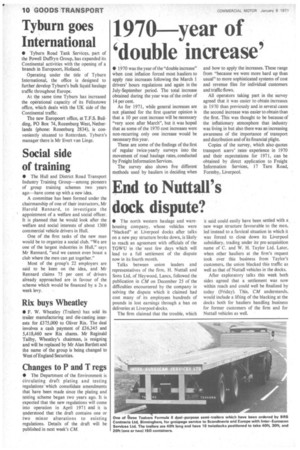1970 year of 'double increase'
Page 12

If you've noticed an error in this article please click here to report it so we can fix it.
• 1970 was the year of the "double increase" when cost inflation forced most hauliers to apply rate increases following the March 1 drivers' hours regulations and again in the July-September period. The total increase obtained during the year was of the order of 14 per cent.
As for 1971, while general increases are not planned for the first quarter opinion is that a 10 per cent increase will be necessary "very soon after March", but it was hoped that as some of the 1970 cost increases were non-recurring only one increase would be necessary this year.
These are some of the findings of the first of regular twice-yearly surveys into the movement of road haulage rates, conducted by Freight Information Services.
The survey also shows five different methods used by hauliers in deciding when and how to apply the increases. These range from "because we were more hard up than usual" to more sophisticated systems of cost and revenue files for individual customers and traffic flows.
All operators taking part in the survey agreed that it was easier to obtain increases in 1970 than previously and in several cases the second increase was easier to obtain than the first. This was thought to be because of the inflationary atmosphere that industry was living in but also there was an increasing awareness of the importance of transport and distribution and of its financial plight.
Copies of the survey, which also quotes transport users' rates experience in 1970 and their expectations for 1971, can be obtained by direct application to Freight Information Services, 17 Tarn Road, Formby, Liverpool.












































































































































